Polyrhythms Pals Build Up the Q-C Community Through Music and Arts
Saturday in the Arts is a weekly feature covering a trend, subject, event or personality of local interest. It runs every Saturday morning on your site for the best entertainment and arts coverage in the area, QuadCities.com!
The next two Sundays will be special for longtime friends Shellie Moore Guy of Rock Island and Nate Lawrence of East Moline.
Tomorrow, Dec. 12, Guy — a well-known local storyteller, poet and author – will make her second appearance with the Quad City Symphony Orchestra in as many months, in a 3 p.m. Holiday Brass concert in Davenport. On Sunday, Dec. 19, the Polyrhythms’ exceptional Third Sunday Jazz Series returns to the Redstone Room at River Music Experience, with Fr. Stan Fortuna (a professional bass player before he became a priest) and his quartet in concert from 5 to 7 p.m.
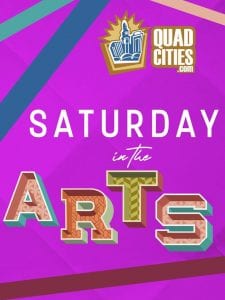
Lawrence and Guy have been friends now for over 35 years, and co-founded Polyrhythms nearly 20 years ago. Their mission is potently mission-driven – extending beyond music. Polyrhythms first formed in 2002. “We were community organizers. Shellie was active in various community projects,” Lawrence said last month. “We were active community builders.”
Polyrhythms/Quad Cities Jazz Festival, Ltd., is a longstanding grassroots non-profit group of community and cultural arts advocates that evolved from the Louie Bellson Jazz Festival.
They first had a program with Quad City Arts, bringing back artists from the Q-C who had gone out to make a name for themselves, he said. That included jazz greats Bill Bell and Donald Meade. “We were bringing them back to demonstrate to people that you could do that, and they modeled that process,” Lawrence said.
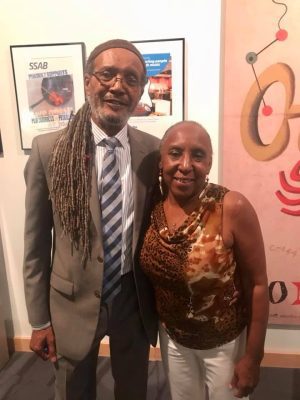
Shellie Guy and Nate Lawrence have been good friends since the 1980s.
Guy also was related to the standout jazz and blues drummer Francis Clay (1923-2008), her uncle, who was from Rock Island.
“He started off as a jazz player, and Chicago blues happened, so he got with Muddy Waters,” Lawrence said. “He was Muddy Waters’ drummer, and because he was a jazz player and was accustomed to set lists, he was the one who taught Muddy Waters to have a set list.”
Clay moved to San Francisco and helped mentor Hawkeye Herman, a well-known Q-C blues guitarist.
“He was a very well-respected drummer,” Guy said of Clay.
Illinois Arts Council had an effort to support programs regarding the Mississippi River, including artists inspired by the river, she said, noting they got funding support from them and Polyrhythms grew out of that.
Their first Third Sunday Jazz concert was pianist Willie Pickens and the second was pianist Bill Bell. There was a gap of about six months after the first four concerts to the next ones in the series, Lawrence said.
Bell (a beloved East Moline native) played at least six times, not counting other times he came for other events, he said.
Polyrhythms is the only program that’s brought live music to the Redstone Room on a monthly basis for 15 years straight, Guy said. “You just don’t get the consideration and respect you deserve,” she said.
There’s a history of Blacks being excluded in a lot of ways, Guy said, noting jazz overall has earned a lot of respect in the Q-C (as the place that birthed Bell, Bix and Bellson). “We’re a little bitty organization that does so much,” she said of Polyrhythms. “Why can’t we be given the same consideration as some of the other organizations?”
“We have a 15-year track record,” Lawrence said of their top-notch lineup of artists. “We’re not this fly-by-night; we didn’t go away. We’ve been here 15 years.”
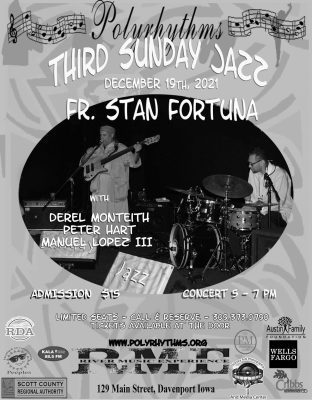
The upcoming Dec. 19 concert at the Redstone Room will feature Fr. Stan Fortuna and his jazz quartet.
“We’re high-class entertainment at an affordable cost,” he said. “Goodness gracious, people should be having parades for such ideals, but no, for having the audacity for having such a mission, we get omission. We’ve survived because we’ve found a few that were sincere and have been in our corner.”
Polyrhythms has a group of patrons who have been regulars, Guy said.
“A lot of people in our shoes would have put up their hand and gave up, but we’re still here,” Lawrence said with pride, noting they outlasted the Covid pandemic. Survival is due to sheer persistence, grant support and not wanting to be driven off the cultural scene, he said.
“You don’t get to decide if I get to do this,” he said. “We get to do this because our community needs somebody like us to do this.”
Polyrhythms’ philosophy is not only to demystify jazz as an art form, but to expose more people to jazz – a fundamental American art form, Lawrence said. “If you don’t know the fundamentals, you don’t get to play,” he said. “We could have picked a more popular thing, but this forced people to learn the fundamentals.
“It’s like reading and writing – once you learn how to read, ain’t nobody can stop you,” Lawrence said. “It’s the same way with music – once you learn how to read, there’s nobody can stop you from understanding what you understand. We could have done smooth jazz, which is cool, but it’s full of shortcuts. We said from the beginning, we’re not trying to drive people to Carnegie Hall.
“We’re just trying to give some alternatives to the nothing alternatives our kids have as an option,” he said. “It’s a positive alternative; we swear by it; we believe in it, and that’s why we did it.”
Guy said it’s a genre of music that was created in America, and this legacy must be kept alive.
“That people are responsible for nurturing legacy, promoting and teaching, and we wanted to be in that number,” she said.
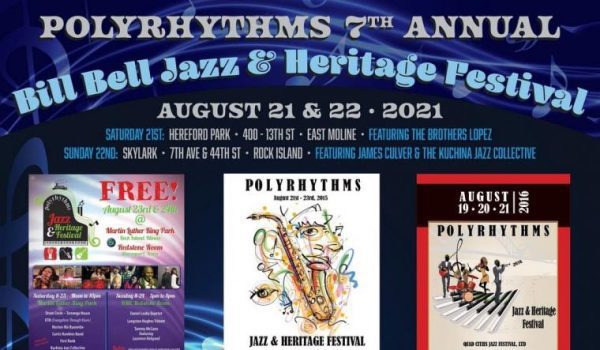
This year’s Bill Bell Jazz & Heritage Festival was held in East Moline’s Hereford Park and Rock Island’s Skylark Studio.
Guy and Lawrence have known each other since the ‘80s, when they were involved in the King Center in Rock Island, and she was working in substance abuse prevention at RICCA. Lawrence did public relations for the King Center, running his own firm, Homefolks Communications.
They were creating programs for young people, doing community organizing. Guy later worked for RICCA as a treatment counselor in the ‘90s.
Bill Bell came one weekend to perform at the old Capri Theater in downtown Rock Island (in the late ‘90s), and Guy wrote a poem for the occasion. She had not met him before, though was familiar with him. The poem spoke about the importance of coming home.
“He became who he became, because of the influence of home,” Guy said. “So I came to know him because of that, what he was talking about. He was such a fine gentleman, but he was very adamant – he wanted people to know where he came from. But he also understood that he was an example; he was very comfortable about being a role model.”
Lawrence said he came from a strong musical community, including his cousin, the music director at United Township, Mallie Williams. Bell played piano for Mt. Zion Baptist Church as a teenager.
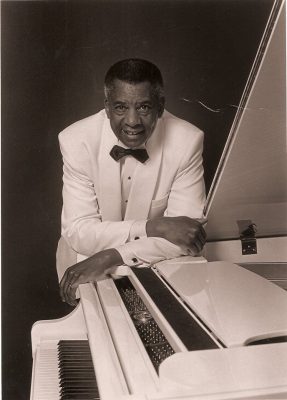
Jazz pianist, composer and professor Bill Bell (1936-2017) was born in East Moline.
“There were a lot of musicians,” Lawrence said of the Q-C area. “There were several venues people played.”
“He also talked about what it was like being from that community,” Guy said of East Moline. “When you come from a neighborhood, there’s that thing about people know who you are, and people care about what you care about. People are asking constantly, how are you doing in school?”
Bell was a musical prodigy and was supported in his hometown.
Guy said that’s how she was raised as well – people weren’t just encouraging prodigies. “They were encouraging all of us in those neighborhoods,” she said. “He took all of that with him wherever he went.”
Her poem for him was called “Coming Home.” Before that, Guy first wrote “How Little Billy Learned to Play” and spoke it often for years before she put the children’s book of that name together in 2019. “I wrote it to perform it,” she said. “I didn’t see it as a book. As a storyteller, I presented it for those 20 years, and thought about it, talked about it through the years.”
A Bell that is still ringing
In 1997, Lawrence spoke of his plan then to start a jazz festival in Bill Bell’s name – which ended up happening after Bell’s death in 2017, when they renamed the Polyrhythms Jazz & Heritage Festival (held each August) in his honor.
Bix Beiderbecke (1903-1931) and Louie Bellson (1924-2009) are Quad-Cities jazz legends who at one time both had annual local festivals named in their honor. The Bix jazz festival in Davenport celebrated its 50th anniversary this year. Lawrence has long wanted to elevate Bill Bell to that level of public consciousness.
“Bix and Bellson are wonderful events. We just want to add to that mix,” he said 24 years ago of his plan for an August festival to recognize nationally celebrated jazz musicians who have come from East Moline.
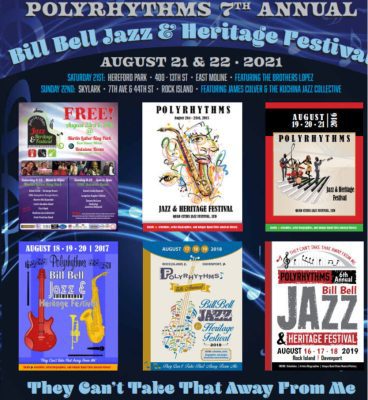
The Polyrhythms Jazz & Heritage Festival started in August 2014.
Bell (known as “The Jazz Professor”) was head of the jazz department at the College of Alameda, Calif., and a composer and pianist who recorded and performed with Duke Ellington, Carmen McRae, Joe Henderson, Benny Carter, Anita O’Day, Nancy Wilson, Lou Rawls and Dizzy Gillespie.
Laurdine “Pat” Patrick (1929-1991) was a composer, arranger and saxophonist who was a longtime member of the Sun Ra Arkestra, a progressive jazz group, and also played with Thelonius Monk, John Coltrane, Lionel Hampton, Duke Ellington and Quincy Jones.
Donald Meade was a jazz educator, historian and former drummer who played with Ella Fitzgerald, Miles Davis, Jon Hendricks, Oscar Peterson, Art Tatum, Johnny Griffin, Milt Jackson, Billy Taylor, and Charlie Parker.
“This is a unique area that has produced these musicians and nobody here knows about ’em,” Lawrence, a native of the Watertown neighborhood, said then. “We’re always looking for role models, people to emulate.
“We should know these things. We should have these things available for children,” he said of the proposed Bill Bell Jazz Festival.
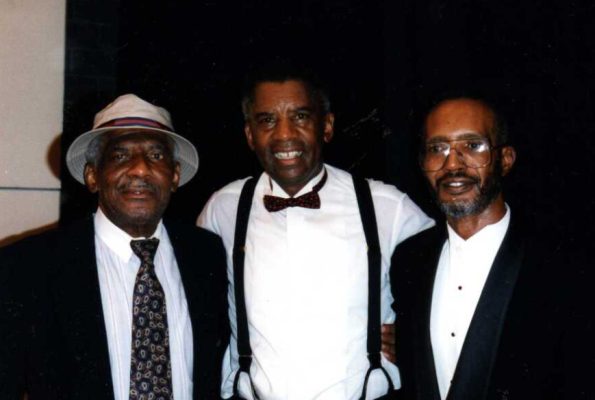
Lawrence, right, with Bill Bell (center) and Donald Meade.
Bell died at age 80 in March 2017 in Oakland, Calif. He never forgot the Watertown section of East Moline where he grew up being called “Little Bill.”
Bell’s training as a musician began in Watertown, where he played piano for services and classes at Mt. Zion Baptist Church. He took piano lessons at home and learned to read music and score musical arrangements from his cousin, longtime United Township High School music teacher and band director Mallie Williams.
After graduating from UTHS, Bell earned a bachelor’s degree in music education from Augustana College in 1958 before obtaining a master’s degree in music education from the University of Iowa.
He taught in Iowa for a few years and then headed to the west coast in the 1960s. In 1966, he appeared on a recording called “The Nifty Cat Strikes West” as a member of the Roy Eldridge Sextet along with Eldridge, a legendary trumpeter, and Bellson, a Moline native hailed as one of the all-time great jazz drummers.
Bell went on to make other recordings and composed a work for the San Francisco Symphony. He also began a long career as an esteemed educator that included being chairman of the College of Alameda Music Department, jazz improvisation teacher at the University of California, Berkeley, and director of the Stanford University Jazz Band.
Lawrence at his death said Bell was a true role model for kids, and a regular feature of the Third Sunday series is to present a free 3 p.m. jazz workshop for local students.
“Bill was like a hero in the Watertown neighborhood,” Lawrence said in 2017. “He was accomplishing things. He was going to Augustana — it’s like, ‘Going to college?’ Things of that nature. So Bill was one of those people who made us understand that that was available to us. He was a great role model.”
Expanding Polyrhythms to annual festival
Guy was named Quad City Poet Laureate in 2010, following Dick Stahl, Rebecca Wee, Kathleen Lawless Cox and Dale Haake in the position.
She’s a storyteller, poet and was then radio show host for “Ebony Expressions” on KALA 88.5. As a survivor of domestic abuse, she created a performance about domestic abuse called “Healing Waters: I Will Carry My Sister’s Pain.”
In 2013, with the help of a feasibility grant from Scott County Regional Authority, Polyrhythms began crafting a five-year plan to create an event, to expose and celebrate the legacy of our parents, grand and great grandparents. They held the first Jazz & Heritage Festival Aug. 23 – 24, 2014, and each year after, hosted a festival in Rock Island’s MLK Park and Davenport’s Redstone Room through 2019.
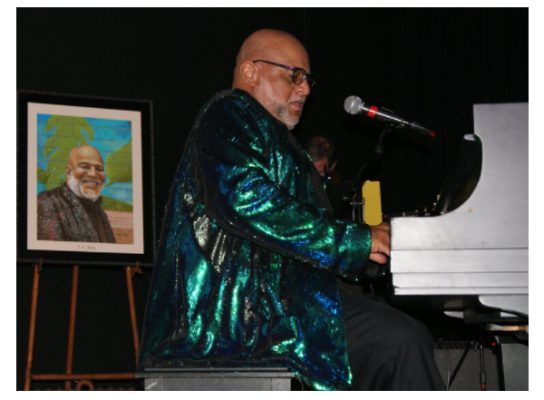
Pianist and Davenport native BK Davis performed at the Redstone Room for the Polyrhythms series in October.
The music encompasses many styles associated with the area: blues, R&B, gospel music, Latin, folk music, rock, rap, country music and jazz, both contemporary and traditional.
“Our grandparents and parents contributed greatly, both physically and creatively, to the success of the Quad-Cities, and we wish to sow the seeds of our unique culture for generations to come,” Guy said before the 2019 event.
“We remain dedicated to creating and growing an exciting and sustainable event that audiences, locally and regionally can relate to,” she said. “We are building and growing a festival reflective of, and befitting, the cultural diversity that builds and sustains the Quad-City area.”
Community development is a conscious effort to improve the lives, understanding and peace of mind of all of our friends and neighbors, she said. After Covid canceled the 2020 event, the 2021 Jazz & Heritage Festival was a scaled back affair this past Aug. 21-22, at East Moline’s Hereford Park and Skylark Studio in Rock Island.
“We missed a year and didn’t want to miss two years,” Lawrence said recently. They weren’t able to use the King Center building this year, so the festival couldn’t be at MLK Park, and the Redstone Room was booked.
After an unanticipated summer off, the Bill Bell Jazz & Heritage Festival returned for a seventh time to help build a positive and meaningful tradition in the form of a jazz- and heritage-themed event that celebrates the indigenous music and culture of people who helped build the Q-C with their blood, sweat, and tears.
On Aug. 22, the festival was at Rock Island’s Skylark Concert Studio, starting with a set by the Polyrhythms Trio, with both bass player Ron Wilson and pianist Corey Kendrick returning, but with trumpet player and area educator Edgar Crockett taking over for trombonist Randy Evensen.
Guy and Lawrence first formed the Jazz & Heritage Festival to build bridges, and present a wider variety of music and activities than Third Sunday Jazz could.
“Musicians understand and know good music,” Lawrence said recently. “If you do it well, I don’t care what you’re playing. It attracts craftsmen, so that’s where we were coming from.”
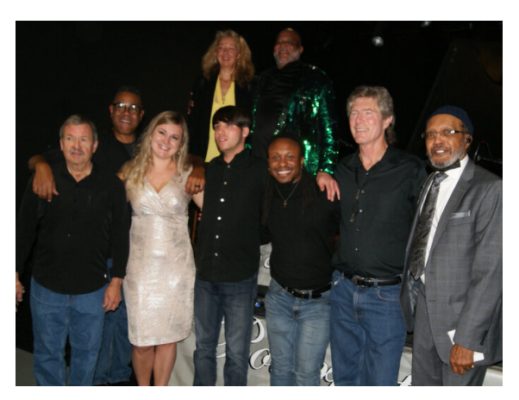
A Third Sunday Jazz Series group photo from October 2021, with Nate Lawrence at far right.
“We can do all these other genres – gospel and blues, but it’s really just to show that it’s all the same thing,” he said. “We’re talking about things that emanated from the African influence.”
“We wanted to be able to showcase or celebrate our ancestral heritage – whatever that means,” Guy said. “We wanted a space to showcase all of that and celebrate all of that.”
Through music and art, the pair still consider themselves community developers – helping to build and grow the Q-C through creative expression and honoring the history and legacy of ancestors here and nationwide.
“We always said we would add something new to each festival,” Guy said, noting after the first few years, they added health and wellness information and activities. In 2020, they considered adding a rodeo and book fair, before Covid scrapped the plans.
“Every year, we would introduce something new,” she said. This year, they didn’t add the book fair, since they didn’t have the King Center.
The Third Sunday series returned this past May, the first musical event back at the Redstone Room since the pandemic, and Polyrhythms’ first since February 2020. Before May 2021, they also did some outdoor driveway concerts, and a couple virtual concerts.
Branching out with the QCSO
While Guy has been a frequent performer and public speaker for decades, she made her Quad City Symphony narrator debut for the Masterworks concerts – narrating Michael Abels’ “Frederick’s Fables” Nov. 6-7. Abels is perhaps best known for penning scores for the films “Get Out” and “Us.”
“I love the stories!” Guy said last month of the Abels fables. “We’re all familiar with these kinds of children’s stories. They bring back that time when someone read to you or you read them to someone else. Adults as well as children appreciate good stories.
“When I first read ‘Frederick,’ it reminded me of African folktales,” Guy said. “The protagonist sometimes seems on the surface, to be someone who is really doing something different from the others and would be easy to disregard him, and think of him as maybe lazy or shiftless or just different. It turns out, he has this incredible knowledge and actually teaches and saves them. Fables entertain, but they’re also full of life lessons.”
The music adds weight and drama to the spoken story, Guy said.
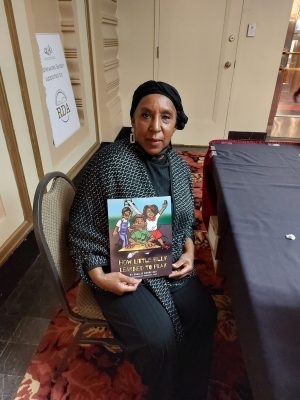
Guy’s children’s book “How Little Billy Learned to Play” was written as a tribute to musician Bill Bell (1936-2017), illustrated by Marshall Pass, and published by MWC Press.
“The music, like the stories, contain all of the emotions,” she said. “Because in these stories you have you have excitement, you have discovery and you have fear. And so the score, the music and the words become the story.
It’s also very important that the QCSO has one program with two African-American composers (in a classical music world long dominated by white composers), she noted.
“You know, excellence is excellence,” Guy said. “I think it’s a cool story that Mark Russell Smith grew up with Michael Abels and they both became excellent musicians and directors.”
“But there are plenty of Michael Abels around.” she said. “It’s good for the entire community to know this, and to experience something, to experience the work of composers that are not always presented.”
“Directors of symphonies do what they’re comfortable doing; they present what they’re comfortable presenting,” Guy said. “I think that Mark Russell Smith is someone who is comfortable with presenting works that haven’t been heard before here in the Quad Cities. That’s a good thing. It’s a great thing.”
Of the pioneering William Grant Still, she said: “It’s just a great story. His journey to becoming a celebrated conductor and composer is an African-American story and an American story. And here we are presenting his work in the Quad Cities, which is a huge step.
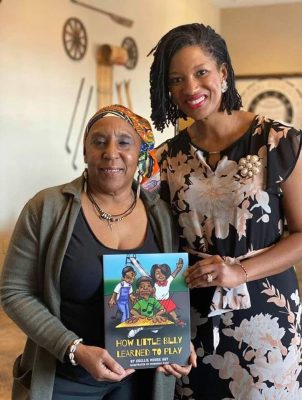
Shellie Moore Guy with Kit Ford.
“Historically in this country, we’ve been presented with the stories and the people who do not resemble the Stills and the Abels,” Guy said. “It is good to see that Quad City Symphony is presenting something more.”
After the concerts, she said: “It went really well both days. It was different for me. But it was exciting. They’re very good. It’s much different when you’re on the stage with them.”
“I can’t say enough about Mark Russell Smith. He’s a fabulous leader and the orchestra is excellent,” Guy said of the QCSO conductor and music director. “It was challenging – I had sheets I was working with and I had the recording. I knew that I was going to have to memorize the stories, even though I didn’t have to. The challenging part was working with the orchestra.”
“Though I had rehearsed with the music, you don’t know it until you get to rehearsal,” she said, noting she only had two run-throughs with the orchestra before the performance. “I just relied on the conductor and it was a wonderful experience.”
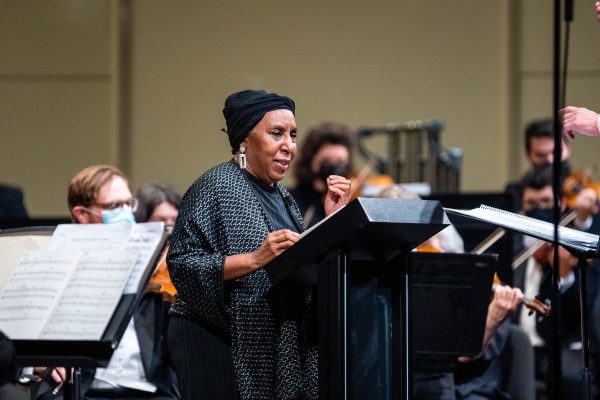
Shellie Moore Guy narrating with the Quad City Symphony Orchestra during a November Masterworks concert.
The Sunday show, there were a lot more people, and a more diverse crowd (including by race), Guy said. “There was a large group from Frances Willard Elementary School and I think they had 50 kids there. There was a good mixture of different people there. The whole concert was enjoyable.”
The QCSO abided by the maxim, she said, if you want a diverse crowd, you have to create an atmosphere where they feel welcome.
“We assume that only white people like that kind of music, but a lot of people that I know, that I talked to before and after, were familiar with that,” Guy said. “But for a lot of people, it was their first time – like me.”
A lot of white people don’t attend the symphony either, she noted.
The QCSO brass and percussion sections will perform a Holiday Brass concert on Sunday, Dec. 12 at 3 p.m. at St. Paul Lutheran Church, 2136 Brady St., Davenport.
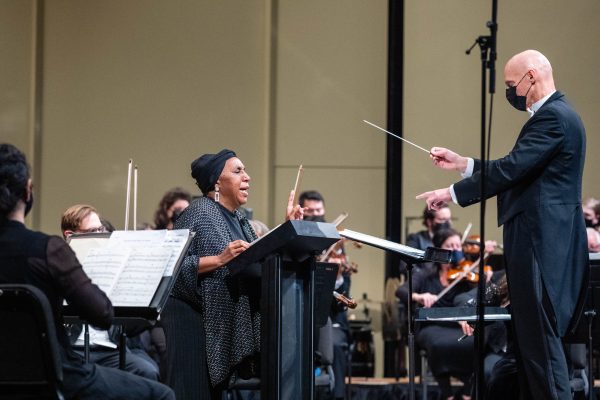
Shellie Moore Guy narrating with the Quad City Symphony Orchestra during a November Masterworks concert.
The ensemble is joined by organist Chris Nelson and narrator Shellie Moore Guy to perform uplifting selections of classical and holiday favorites, including Samuel Barber’s Mutations from Bach, Johann Sebastian Bach’s intricate “Little Fugue” in G minor, Twas the Night Before Christmas, and a selection of favorite carol arrangements by Anthony DiLorenzo.
Guy will be narrating “Twas The Night Before Christmas,” the classic 1823 tale about St. Nick by Clement Clarke Moore.
“I’m very excited to be joining the QCSO again,” Guy said. “This poem/story was a favorite in my family growing up. My father read the story to myself and siblings during the Christmas holidays so it means a lot. I am looking forward to sharing the story with the community, especially the children.”
Facial coverings will be universally required for all indoor QCSO concerts. All QCSO concert venues are approved for full seating capacity, but patrons may request a socially distanced seat. These seating requests can be made by calling the QCSO Box Office at 563-322-7276 or emailing info@qcso.org.
Brian Baxter, executive director of the QCSO, said recently that people were thrilled with Guy’s performance last month.
“She’s a poet laureate and she’s got her own writings and stuff. And so it seemed like a really nice match to have her narrating and she and Mark worked really well together and really hit it off,” he said. “And so it was kind of like, do you want to join us for this program as well?
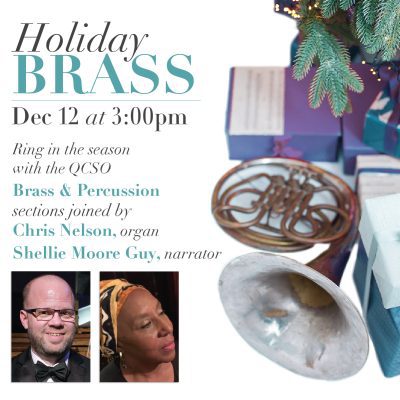
The QCSO Holiday Brass concert is 3 p.m. Dec. 12 at St. Paul Lutheran Church, Davenport.
“When we have good experiences like that, we like to repeat them,” Baxter said of asking Guy to come back. “It’s sort of happened that this opportunity was available and let’s get Shellie. She was great.”
“We had a lot of positive feedback on that program, including that performance of that piece,” he said of the Abels. “We felt very good about that. I think it went really well and a nice thing about a piece like that, and grabbing a narrator like Shellie to join us, is that obviously, she’s taking this story — those fables, by Leo Lionni — but it’s in her voice and she’s deeply connected in the community, and she has a following. So, it was nice. I think people a lot of people appreciate that she was there and that she’s a member of our community — that contributes a lot.”
Also involved in theater diversity and Civil War history
As if she’s not busy enough, Guy also is passionate about improving diversity in local theater and raising awareness about a Black regiment of soldiers during the Civil War.
She attended the Oct. 23 Music Guild meeting on improving diversity among area casts, crews and subject matter. Guy was involved in Playcrafters’ 2008 diversity initiative, which pledged to do a Black production every year for three years (more have been done since). She was disappointed that other local companies didn’t follow suit.
“No one was challenged,” Guy said in October of other theaters that didn’t enhance their diversity of programming and performers. “I hear constantly, ‘We don’t know what we don’t know. We don’t know how to do it.’ We’re talking about otherwise intelligent individuals who don’t know how to do that. As long as you can get away without changing, then you don’t have to change. If there’s only a few Black people talking about it, we’re on the outside anyway, so we don’t have the power.”
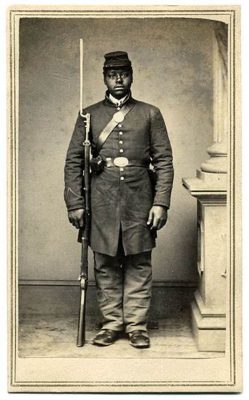
Manual Taylor was born a slave in Kentucky, and became a member of the 108th Regiment of U.S. Colored Troops, performing garrison duty in various parts of Kentucky and was then sent to Rock Island during the Civil War to guard Confederate prisoners of war at Rock Island Prison on Arsenal Island.
“This is an important day; this is an important conversation today,” she said at the Guild forum. “If you all, who run these companies, cannot admit that you’ve done nothing – without saying we don’t know. We have to be on the same page. “We just didn’t do it’ – that’s what you say. And what we hear all the time is, they just didn’t show up. You’re still saying that in 2021? You just have to give it up and say, ‘We haven’t done it’.”
More recently, Guy added that they continue to press diversity, equity and inclusion issues – as they have for decades, before it became more fashionable in recent years.
“Because we are still doing the work, and in fact have added to the volume of our work, it is obvious we still consider ourselves to be organizers, etc.” she said by e-mail. “We are still having the same private and public conversations about diversity. We were not aware that the last two years added to the urgency of diversity, equity and inclusion.
“Though it seems more white people are now talking about these issues, especially since the murder of George Floyd, it has always been important and urgent to the marginalized and under-served groups,” Guy said.
Her great-great-grandfather and his brother were in the 108th Regiment of the U.S. Colored Troops (USCT). Guy is a leader in a Facebook group that includes descendants of men of the 108th USCT and others who are dedicated to honoring the regiment and telling their stories. All reside in the Q-C area, and Arsenal Island was once the site of the Rock Island Prison Barracks during the Civil War. The regiment guarded Confederate prisoners of war at the barracks from September 1864 to May 1865.
Despite the108th’s important actions, contributions and historical relevance, the story of the courage of the former slaves and the freemen who joined Civil War regiments in an effort to free themselves and their families and ending slavery has not been widely known or shared in this area, according to their Facebook page.
This page will honor the 108th USCT and other Colored Union regiments and their service during the Civil War, by uncovering stories about their lives before, during and after the war, and educate through information, stories, photos and events.
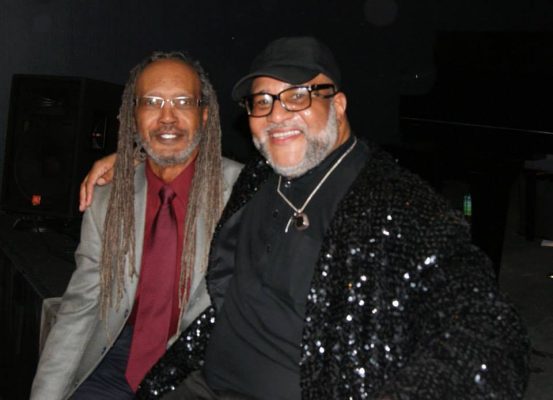
Nate Lawrence, left, and pianist BK Davis.
“Each of our goals is to research all of the men who were in that regiment, and find out more information about each of those men,” Guy said, noting they’re partnering with an organization in Kentucky, where the 108th started.
The topic is very little-known among the general public, she said. “People are very interested; it’s an active Facebook page. People are participating and that’s a big deal.”
Once people became more knowledgeable about history, which has been hidden for years, they find out the truth about the Civil War and the influence of Black soldiers, Guy said. “People are just voicing opinions on what we’ve found out. A lot of us knew the truth of course, but we’re at a point now where more people are listening.”
Lawrence said it’s a natural progression; he’s impressed with the growth of the 108th group, and there’s a lot of work that goes into it.
“They’re just phenomenal researchers,” Guy said. “It’s important – when you think there’s a whole group of people, most of whom were enslaved and fighting for their own freedom, and nobody talked about it for centuries.”
“That’s how we treat history in this country,” Lawrence said.
“People are finding out and they’re outraged,” Guy said. “When you have truth meeting outrage, you’re going to have something changing, and people – most of us – want to see something they can see. We’re seeking for statues come down. We want to see something change.”
James Baldwin once said that America would never be great until it dealt with racial problems, Lawrence said. “It’s true,” Guy said.
She’s working on her second children’s book, to be about her family, and ancestors who came to Rock Island after the Civil War, after being enslaved in Kentucky. Her book will be called “The Family Tree,” and she hopes to work with the same illustrator, who’s from Rock Island and lives in Davenport.
A heavenly Third Sunday Jazz concert
In a recent promo release, Fr. Stan Fortuna said: “I am looking forward to December 19, the Third Sunday, at Polyrhythms Jazz Series, where I plan to reconnect with my friend and smoking brother Manual Lopez III on the drums and we are going to have a little quartet action, with Derel Monteith on piano and Peter Hart on saxophone. And we are going to improvise and that’s what I love to do.
“The spontaneity of improvising over the form of standard songs is just a beautiful thing and the art of improvising is something that motivates me as a bass player and as a singer,” the priest said. “But mostly, we are just going to play, and as they say in basketball, let the game come to us. We are going to call the tunes, call the tempo and all the musicians are going to be comfortable with the songs that we play and then we are going to let it rip, let it go, let it slide, and hopefully make some beautiful music. I love it!”
Fr. Stan Fortuna, a Roman Catholic priest ordained Dec. 8, 1990, is one of the eight founding members of the Community of Franciscan Friars of the Renewal (an order established in the Archdiocese of New York under the jurisdiction of John Cardinal O’Connor). Prior to his conversion, Fr. Stan was a professional jazz musician who studied with the legendary Lennie Tristano.
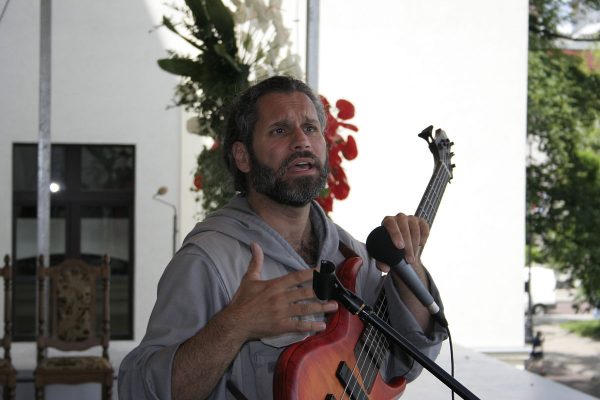
Catholic priest and jazz bassist Fr. Stan Fortuna will perform in the Third Sunday Jazz Series on Dec. 19 in the Redstone Room.
Fortuna often played sessions in New York City and the Tri-State area. He played in some of the most prestigious venues in jazz — Birdland, Lincoln Center and Town Hall – along side the likes of Warne Marsh, Lee Konitz, Sal Mosca, Connie Crothers, Lennie Popkin, Carmen Leggio, Don Hahn, Tardo Hammer, Alvin Queen, Peter Scattaretico and Peer Prisco.
With the latter two, he formed the Scola Tristano Trio, which produced a number of jazz albums, and continues to perform with them today when time permits.
While studying to enter the priesthood during his formation years, Fr. Stan was working in Spanish Harlem. It was there that he encountered hip-hop firsthand in the street, a style he refers to as “rhythm and rhyme,” and was captivated by its improvisational nature. He heard people in the neighborhood ‘rap’ about their daily lives/struggles and soon learned how to integrate this phenomenon and technique into his own heart and music and use it to reach out to the less fortunate and beyond.
Like Lawrence and Guy, Fortuna has been involved with community development and the implementation of various social programs in his neighborhood of the South Bronx for over 25 years. In 1987, he established his nonprofit company, Francesco Productions, mixing music and message. Fr. Stan has since independently released several CDs as well as DVDs and books. For more information, visit http://www.francescoproductions.com/.
The Polyrhythms Third Sunday Jazz Series is made possible with major support of the RDA, the SCRA, RME, Visionary Arts, as well as the support of Bowman Accounting, Peeples Heating & Air Conditioning, the Cribbs Landscaping, the Singh Family Foundation, Davis Entertainment Network, Radio station KALA, and DJ Mixxin Mel.
Tickets for the Dec. 19 concert are $10; and $15 for reserved seating. For more information, visit www.polyrhythms.org.









